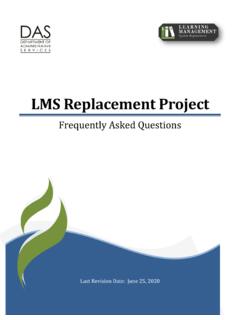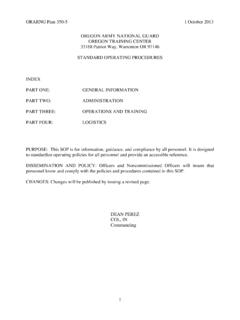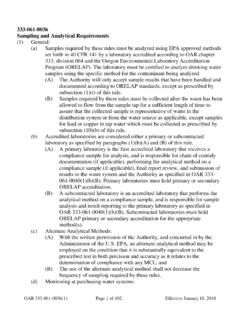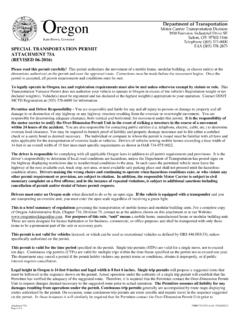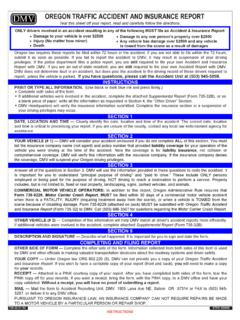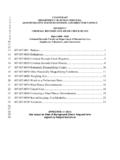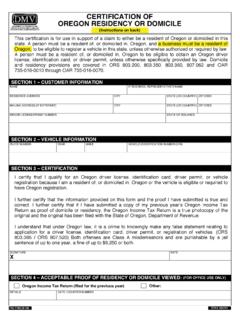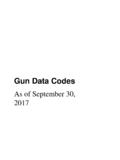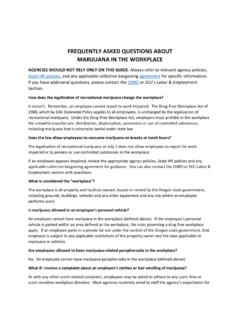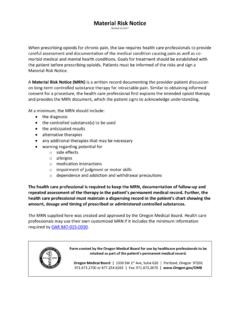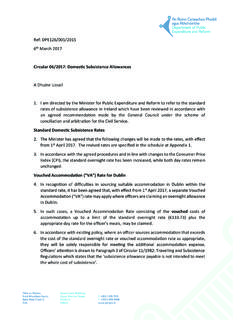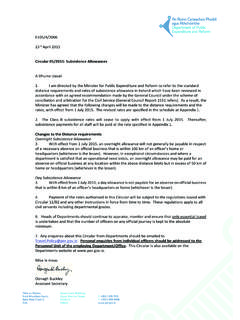Transcription of OREGON ACCOUNTING MANUAL
1 Policy No: 40-10-00 | Effective: 10/1/2018 Page 1 of 18 OREGON ACCOUNTING MANUAL STATEWIDE POLICY NUMBER SUPERSEDES dated 01/02/2018 EFFECTIVE DATE 10/1/2018 PAGE NUMBER Pages 1 of 18 Division Chief Financial Office REFERENCE/AUTHORITY ORS Chapter 291 ORS ORS ORS ORS ORS thru ORS ORS ORS Policy Owner Statewide ACCOUNTING and Reporting Services SUBJECT Travel Statewide Travel Policy APPROVED SIGNATURE George Naughton, Chief Financial Officer Signature on file TABLE OF CONTENTS: 101 General Provisions 109 Compliance and Accountability 110 Travel Status 111 Accountable Plan 112 Meals 119 Lodging 122 Transportation Methods 127 Provisions for Elected Officials and Members of Boards and Commissions 128 Provisions for Authorized Non-State Individuals Including Volunteers 129 Private Vehicle Mileage Reimbursement 131 Travel Expenses Paid or Reimbursed By Outside Entity 133 Travel Involving Two State Agencies 134 Receipt Requirements 136 Overpayments 138 Travel Forms 140 Travel Advances 141 Travel Awards Appendix A: Per Diem Rates, Mileage Rates, and Mileage Chart Appendix B.
2 Using the GSA Rates to Reimburse Private Vehicle Mileage Appendix C: Personal Commuting Examples General Provisions 101. Purpose. The purpose of this policy is to provide guidelines to state agencies for payment of travel expenses in an efficient, cost-effective manner resulting in the best value for the state. Travel for official purposes while at a temporary workstation is reimbursable and includes transportation between places of official business, temporary lodging, restaurants, and similar establishments, as required for the subsistence, comfort, or health of personnel. Each agency is charged with the Policy No: 40-10-00 | Effective: 10/1/2018 Page 2 of 18 responsibility for determining the necessity, available resources, and justification for the need for and the method of travel.
3 Telecommunication instead of travel should be considered when possible. 102. Applicability. This policy applies to state executive, management service, employees represented by AEE, AFSCME, AOCE, CIA, KFAFFA, IAFF, ONA, OSPOA, SEIU and STEA, unrepresented employees, elected officials, members of boards and commissions and authorized non-state individuals traveling on official state business. For personnel with disabilities, the agency has authority to provide reasonable accommodations during travel on official state business. Decisions regarding specific situations not addressed by this policy shall be made and documented by the agency. Employee salary/wage issues associated with travel status are not addressed in this policy.
4 103. Out-of-state Travel. Agencies shall limit the number of officers and employees attending the same out-of-state business meeting and, to the extent possible, develop information sharing for reporting and other aspects that have benefits to more than one person and/or agency. Agencies must be in compliance with ORS regarding out-of-state travel. Out-of-state travel is defined as travel from a point of origin in OREGON to a point of destination in another state and returning to the point of origin. Agency heads are required to approve out-of-state travel or delegate out-of-state travel approval authority in writing to appropriate subordinates.
5 For frequent non-overnight trips out-of-state ( once every other month or more often), it is recommended that agencies keep authorizations on file. The authorizations should cover a specified length of time, which is recommended not to exceed one year, at which point a new authorization should be issued. Agency head pre-approval for out-of-state travel is not required for either overnight or non-overnight travel, but is recommended in the case of overnight travel for internal control purposes. 104. Policy Exceptions. Travel Policy exceptions may be approved by the agency head for his or her subordinates on a case-by-case basis to meet agency business needs.
6 Agencies must ensure that sufficient written documentation exists on policy departures and is signed by the agency head. Approvals for permanent policy departures must be approved in writing by the Chief Financial Office. Agency heads are not permitted to approve policy exceptions for themselves. Policy exceptions for agency heads should be approved by the agency deputy director or CFO. If exceptions are made to this policy, agencies have the responsibility to assess the tax liabilities to the employee and process expense claims accordingly. 105. Personal Expenses. Reimbursement of personal expenses shall not be authorized for payment at any time. For example, employees will not be reimbursed for parking tickets, lodging safe fees or commuting mileage.
7 Commuting mileage is defined as the distance from the employee s residence to primary workstation. 106. Agency Paid Expenses. Every state agency shall try to pre-arrange official state business meetings and have the costs paid directly by the agency when practical. Travel related expenditures or accommodations paid by or provided by the agency shall not be paid or reimbursed to the employee. Agencies are not allowed to direct-bill meals to lodging receipts. 107. Insurance/State Insurance Coverage. This policy does not necessarily insure state employees have tort, liability and workers compensation coverage. Refer to Department of Administrative Services Risk Management for insurance and coverage issues related to state travel.
8 108. Employee Moving Expense. Moving expenses and relocation are not included in the travel policy. Refer to the Department of Administrative Services, Human Resources Services Division Policy , Current Employee Relocation, and Policy , New Employee Relocation, at or Policy No: 40-10-00 | Effective: 10/1/2018 Page 3 of 18 Compliance and Accountability 109. State agencies must comply with all provisions of this statewide policy. Periodically, the Department of Administrative Services may perform a review of the agency s travel records to ensure compliance with all aspects of this travel policy. The Department of Administrative Services may implement appropriate and progressive sanctions for misuse.
9 All travel claims are subject to detailed audit by the Secretary of State Audits Division. All state employees must comply fully with requests for records and documentation supporting all travel expense reimbursement claims. Public employees may be liable under ORS and ORS for improper use of state funds. Public employees who order, authorize, or cause to be made any expenditure in violation of state statutes, rules, policies or procedures can be subject to fines and penalties and be held personally financially liable for inappropriate expenditures. Employees may be held financially accountable for their policy infractions in accordance with OAM (paragraphs 109 through 111).
10 When an agency head or the Director of the Department of Administrative Services determines that the employee or agency head obtained a payment of travel expenses for the employee or agency head by knowingly or intentionally falsifying or misrepresenting an expense item or per diem amount for personal gain, or purposely allowed another person to arrange travel in any manner that does not comply with this policy, the agency head or Director of the Department of Administrative Services may refer the matter to the Department of Justice to seek imposition of a fine under ORS Travel Status 110. Definition. An individual is on travel status from the time they start from and return to their official (primary) workstation.
